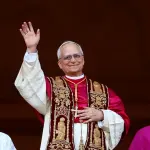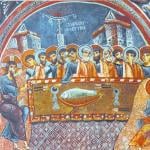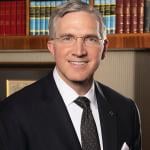I am on monastic retreat until the weekend, and have scheduled two reposts each day of pieces that some may not have read before. Comments will be off until I return. You might like peeking into last year’s Online Retreat
* * *
This was part of that retreat, “PLANNING BRINGS CHANGE”
Last Advent, at one Sunday Mass, the gospel reading was from Matthew 3:12
In those days John the Baptist appeared, preaching in the desert of Judea (and) saying, “Repent, for the kingdom of heaven is at hand!”
It was of him that the prophet Isaiah had spoken when he said: “A voice of one crying out in the desert, ‘Prepare the way of the Lord, make straight his paths.'”
John wore clothing made of camel’s hair and had a leather belt around his waist. His food was locusts and wild honey.
At that time Jerusalem, all Judea, and the whole region around the Jordan were going out to him and were being baptized by him in the Jordan River as they acknowledged their sins.
When he saw many of the Pharisees and Sadducees coming to his baptism, he said to them, “You brood of vipers! Who warned you to flee from the coming wrath?
Produce good fruit as evidence of your repentance.
And do not presume to say to yourselves, ‘We have Abraham as our father.’ For I tell you, God can raise up children to Abraham from these stones. Even now the ax lies at the root of the trees. Therefore every tree that does not bear good fruit will be cut down and thrown into the fire.
I am baptizing you with water, for repentance, but the one who is coming after me is mightier than I. I am not worthy to carry his sandals. He will baptize you with the holy Spirit and fire. His winnowing fan is in his hand. He will clear his threshing floor and gather his wheat into his barn, but the chaff he will burn with unquenchable fire.”
Rather a hair-raising reading, and when the priest finished it, he walked down the sanctuary to deliver his homily. This priest is fairly young, a great teacher of scripture (his classes are always packed) and while he is a lovely person, he always wears that slightly dyspeptic expression which is common to some Irish tribes. He looked out amongst us and pronounced,
“Scary John the Baptist!”
What followed was one of the best, most enlightening, instructive and challenging homilies I’d ever heard – it was fresh and engaging and as Fr. Dyspeptic turned and climbed back up the stairs, the congregation broke out in completely spontaneous applause. The priest’s head was bowed as he took his seat, and he did not acknowledge it.
You who are Catholic know that not only is applause – spontaneous or otherwise – NOT a common or popular feature of our liturgies, but there are precious few homilies that rise to the level of “really pretty good” at mass. This homily was exceptional, and the whole liturgy was energized and raised by it.
When I was mapping out this retreat, I remembered the “Scary John the Baptist” homily and called the priest, who knew me slightly as “Buster’s mother,” and through his classes.
I had planned a retreat on heat, scorching desert, overabundance and transition. I thought the hot imagery of Scary John the Baptist would be useful; I called Father and asked if I could steal the piece for our purposes, here.
“Oh, Scary John,” he said, “yeah, that was a good one, but I can’t give you a copy of it, because I don’t have one. I never write out my homilies.”
I was surprised; the thing had been so perfectly reasoned and built! “That was extemporaneous?” I asked. “I’m impressed. The Holy Spirit must have really been working through you that Sunday.”
“I learned a long time ago,” he said, “to just get out of the Holy Spirit’s way. I read the scriptures, meditate on them, and just trust that what comes out of my mouth will be useful.”
Still operating in my hot/desert/abundance mode, I wasn’t listening closely enough to that part. I apologized for bothering him, told him about the online retreat idea and expressed regret that I could not reproduce the homily for you, here.
“Well, if you want ” he said, “come by tomorrow and maybe we can rebuild parts of it.”
“Why don’t I send you a link to my blog first,” I said, “so you can look at it; you may find you hate the blog and don’t want your thoughts associated with it.”
“I don’t have a computer,” he said matter-of-factly. “They lied to us. They said the computers would make our lives easier, but in truth they’ve complicated things. They may be helpful but too often they’re just one more distraction; instrumentation that comes between us and each other, or us and ourselves.”
I laughed a little to myself. I love this man – he’s adorable and holy – but he can be such a crabass.
Meeting the next day we looked up the passage, Father read it and then we talked for an hour – a wonderful, instructive, engaging hour, and I took random notes, which looked like this:
– John’s scariness; primative. Unsophisticated and a little exotic. He is the wild man, of wild places, he is not civilized. There is in him no facade of civilization or society. He delivers a unfiltered message, one undistracted by the worldly things or the niceties. He disgusts the Sadducee’s and Pharisees who see themselves as more “nuanced” and sophisticated, and thus wiser.
– he is scary in politics and in person
– milk and honey – the perfect food because no animals have to die. John is not afraid to reach his hand into a hive for food; perhaps John’s wild exterior belies a peaceful oneness with created creatures, or perhaps wild bees and wild men understand each other.
– John eats locusts, which are all wildness, and have a connection to one of the great plagues. Metaphorically, this guy is so scary he “eats the plague,” and is sustained, not destroyed. Suggestive of great power and mysterious source.
– Jesus and John were delivering essentially the same message, but John was the isolated, anti-social and activist counterbalance to Jesus, who was at ease socially, and more diplomatic. John is the last prophet preaching the scary stuff.
– Scripture doesn’t say, but Elizabeth and Zechariah were older parents. Perhaps they died while John was young; perhaps John was even spent some time living with Mary and Joseph – or perhaps he ran off early to the desert. Did he and Jesus play together? Did Jesus learn early on to give his extreme cousin a wide berth?
– Prophets are holy; “set apart.” John was prophetic even in the womb, when he responded to Mary’s greeting and the presence of the embryonic Christ. Scary John does not “work” in society; he’s sort of the “necessary other.” We don’t know how long he lived alone in the desert, but he had to come to terms with his separateness early on.
There’s a lot more. My notes go into John – the last prophet – being a reflective corrective to Samson, the last judge, whether Quentin Tarantino based his character Jackie Brown on Delilah, the Zoroastrians, Syncretism, the Babylonian exile and whether Jerusalem is real estate or the place to live “within ourselves.” A far-reaching discussion.
“I don’t know if you’re going to be able to make anything of that,” Father said as I got ready to leave.
“No, this is going to be great,” I enthused, thanking him.
The the retreat began, and from the very beginning – practically the first post – my lovely plans about heat and super-abundance proceeding until a transition to cooling and sparsity must occur was left in the dust as the Holy Spirit seemed to be leading me, over and over, into reflections about openness and about allowing things to happen in our lives, and around us, instead of putting up resistance, or creating false limitations
I have tried, every day, to find a way to insert the notes about Scary John the Baptist into this retreat in a meaningful way, and every day, there was an obstacle; it could not be done, not if I wanted to be obedient to where I felt led.
“I learned a long time ago,” Fr. Dyspeptic had said, “to just get out of the Holy Spirit’s way.”
Maybe another way to say that is “to step into the path of the Holy Spirit, unencumbered, and let myself be used.” A homily put down on paper is a homily with limits. Once you have that paper, you feel bound to deliver it, and so you’re bound to the page, rather than open to where the Spirit might lead. You have put up a roadblock, an encumbrance, and put it “in the way” of what the Spirit might be trying to do. That doesn’t mean we should never write a thing down – or ever make a plan – sometimes you have to. But perhaps we should attempt to step into the path of the Intention of the Holy Spirit, and let it use us, regardless of what we may have planned. When we see a plan changing, we should simply bend with it, instead of trying to have our own way.
I had wanted the heat and intensity of Scary John the Baptist. Instead I got his quietness; his otherness – the set-apartness to which he was born, and to which he bent in obedience, even if it was a lonely obedience, or an exotic, misunderstood obedience.
Civilization, nuance, sophistication…they can get in the way; they clutter us up and create unintended blockades to the most primal part of our inmost being – the part where God speaks; the part through which – if the barricades are down and the lines are open – the Holy Spirit may flow.
I did not know, when I left Fr. Dyspeptic’s office, that he had set the whole tone of the retreat. It was not in the plan – not my plan, anyway.
The lesson here? When making plans, include within them a willingness to bend into the curve of the Holy Spirit, rather than fighting it; things have a way of working out.
He who binds himself to a joy
Does the winged life destroy.
But he who kisses the joy as it flies
Lives in eternity’s sun rise
— William Blake















